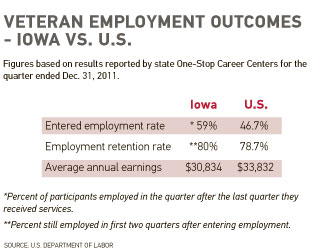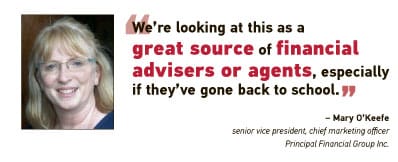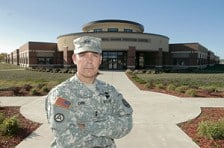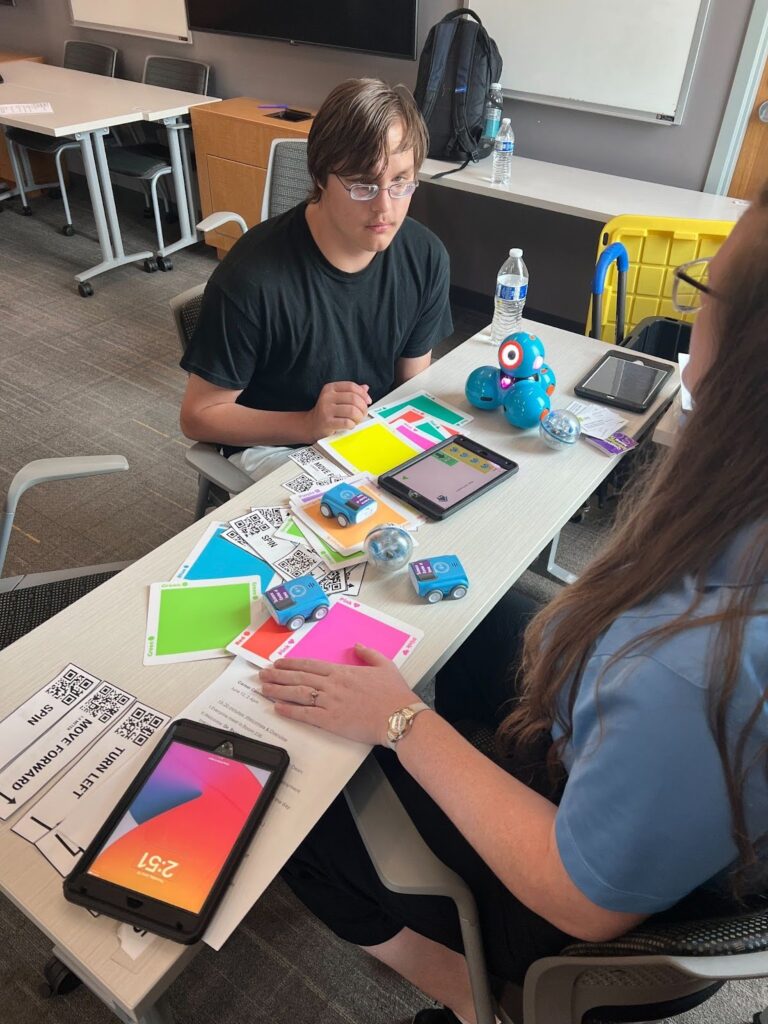Heroes for hire
Good news: Smart programs have tripled the Iowa jobs for returning veterans

A year ago, when the Iowa National Guard’s largest unit – the 2nd Brigade Combat Team, 34th Infantry Division – was returning from two years in Afghanistan, about 25 percent of its more than 3,500 members were unemployed.
A concerted effort in the past year to connect businesses with Guard and Reserve members has shrunk that figure to less than 8 percent, said Maj. Gen. Timothy Orr, Iowa’s adjutant general.
“When you look at Iowa’s unemployment being a little over 5 percent, we would say there’s still work to do,” Orr said. “But that’s pretty good success compared to many states around us, where I don’t think they’ve had that kind of response. It’s been a team effort from the very beginning to take this approach, and more important, to care about our veterans. I’m very pleased with that effort.”
Orr wants to do even more. He said he wants Gov. Terry Branstad and the Iowa Legislature to enact tax incentives for all military retirees. Those incentive could help attract to Iowa a sizable portion of the coming wave of military retirees – about 100,000 nationally – expected in the next several years.
According to the latest national figures, the unemployment rate for all U.S. veterans at the end of August was 6.6 percent, or 720,000 unemployed veterans. That was 32,000 fewer than at the end of July.
“The fact that the veteran overall unemployment rate is lower than the national unemployment rate continues to indicate that as a class they are still having better success finding employment than non-veterans,” wrote Todd DayWalt, president and CEO of VetJobs Inc., which operates a jobs website for veterans. “This is reinforced by how there have been fewer unemployed veterans each month.”
That overall success is overshadowed by the fact that the unemployment rate nationally among the youngest veterans – those 18 to 29 years old – remained at nearly 20 percent.

Programs that work
Hiring veterans is not just a politically correct move or a patriotic knee-jerk response for employers, Orr said. In addition to providing companies with disciplined, physically fit leaders accustomed to dealing with change, putting policies into place to hire veterans could also provide an important economic development tool for the state, he said.
Several current initiatives have helped to lower the unemployment rate among Iowa veterans. Continuing the following efforts will help ensure that returning veterans are assimilated back into the work force, say military and business leaders.
• On Nov. 14, Greater Des Moines employers again will participate in the Hiring Our Heroes Job Fair. Principal Financial Group Inc. helped launch the statewide event a year ago through a coalition of Iowa business and veteran services organizations.
• Iowa for the past year has participated in the pilot phase of a National Guard Bureau program known as the Job Connection Education Program (JCEP). Through that program, a team of employment specialists tracked the education and employment plans of each service member throughout his or her deployment.
• On Oct. 1, a new federal hiring program for veterans called Heroes2Hire officially started. The job database at www.H2H.jobs is free for both employers and veterans to use and currently has more than 1,200 openings with Iowa employers posted on it.
• Federal tax credits are available to companies that hire veterans through the Vow to Hire Heroes Act, a federal law enacted by Congress in 2010.
Tying these resources together is a network of more than 160 Employer Support of the Guard and Reserve (ESGR) volunteers who visit Guard armories during weekend drills to educate service members about these programs, said Shawn Hippen, Iowa business adviser with the Job Connection Education Program.

‘Fort Iowa’ approach
“I think our biggest success in Iowa has been our toolbox approach,” Hippen said. “It’s a collaborative effort, working together to help the service member to link up with that civilian employer that’s trying to hire them.”
The National Guard Bureau first tested the Job Connection Education Program in Texas in 2010 with units that were experiencing unemployment rates as high as 50 percent among soldiers returning from deployment. After finding the program successful there, the bureau decided to further test it in Iowa, Orr said. The approach was nicknamed the “Fort Iowa” approach because Iowa has no active duty bases, only National Guard and Reserve units.
Beginning prior to deployment and following up every three months, the brigade monitored each member’s employment status or education plans.
As the soldiers were outprocessing from the deployment, “we basically said, ‘Are you going to school? If not, what do you plan to do?’” Orr said. Those who were continuing their education were assisted in completing applications for tuition assistance, while those needing work were connected with employment resources. “So we had a pretty good handle on who needed employment,” he said. “And then in the next 30, 60, 90 days, (the JCEP team) linked up with every unit that deployed to really focus on that effort.”
Principal’s lead involvement in the Hiring Our Heroes Job Fair began as the insurer was looking for ways to celebrate its 10th year as a publicly traded company, said Mary O’Keefe, senior vice president and chief marketing officer. Its initial public offering in New York City in September 2001 was delayed due to the 9/11 terrorist attacks, which inextricably linked the insurer to that national tragedy.
After assembling a coalition to brainstorm the hurdles that returning veterans face in being hired, Principal officials identified needs for counseling and mentoring programs for veterans, as well a need to address what officials say are exaggerated fears among employers about post-traumatic stress disorder and traumatic brain injuries. The company developed a presentation for employers that it has distributed through the regional chambers of the Greater Des Moines Partnership.
“One of the major messages (of the coalition) is that if we’re going to keep a volunteer military in this country, employers are going to have to jump in,” O’Keefe said.
Employers have responded well to the call, she noted. After presenting the program during the Partnership’s annual dinner in January, for instance, an attorney telephoned her the next day and offered pro bono legal services to veterans who wanted to start their own businesses.
Principal has hired several returning Guard members in recent months and is keeping its radar attuned to new candidates as they complete higher education programs, O’Keefe said. “We’re looking at this as a great source of financial advisers or agents, especially if they’ve gone back to school,” she said. “We think this is going to be a terrific pool (of new employees).”
Back to school
With the attention that Congress has given to financing veterans benefits, incentives for Guard or Reserve members to continue their education are particularly strong right now. Nearly 1,500 Iowa Guard members currently are enrolled in the National Guard Education Assistance Program. This fiscal year, the program is reimbursing members 100 percent of the state universities’ tuition rates, or the equivalent amount toward a private college’s tuition.
“That may be the largest enrollment we’ve ever had, or pretty close,” Orr said. “And the benefit is the most that has been offered in years.”
One of the goals of the federal JCEP program is to provide veterans with long-term skills they’ll be able to use the rest of their lives, Hippen said. “One thing we’re pushing really hard now for young people who don’t want to go back to school is apprenticeships and on-the-job training, where they can use their GI Bill benefits to gain a skill or a trade,” he said. “That allows that farm kid from Sac City, Iowa, who doesn’t want to go to four years of college to become a welder in Sac City.”
Or other people may want to enroll in the one-year CNC (computer numerical control) machining course at Des Moines Area Community College to train for positions that start at $15 an hour.
Money is no problem
Usually finding money to support a government program is a continuing issue, but Orr says that’s not the case right now.
“Actually, it’s a growth industry right now,” he said. “That’s not to say we won’t see a reduction over time. We’re blessed that we’ve figured it out in Iowa, and that this team has figured out how to work together and we’re good stewards of the resources. Knowing that it could get tighter at some point, we want to make sure that we have the programs in place that will sustain that with the resources we have.
“The fear that I have is that we’re going to frustrate our employers by not having the veterans to give them,” Orr added. “That’s a good problem to have to some degree.”
In respect to keeping a supply of veterans for employers to tap, Orr said exempting veterans’ military retirement income from state taxes would be a smart move for Iowa. Several neighboring states, including Illinois, Minnesota and Wisconsin, already have those exemptions in place, he said.
“We think that (proposal is) a huge investment for our state, particularly when the governor is trying to attract citizens back to the state who have skill sets,” he said.
“I think what soldiers are going to do is go where the best value for their dollar is. In many cases they’re going to look to states like Texas, Florida, Illinois, where their retirement is not taxed. Once we get them here, I don’t sense there’s an issue in finding them employment. We can do that.”











